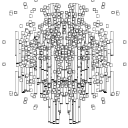While experimenting with @solipp 's patch, I've found that, if I use a Trigger to bang the [open(, "sample size" and "find zero-crossings" in that order, the output is always the same for a given sample. With the contrabass sample, the result is excellent and the pitch is... almost the same; I hear a very slight difference. I tried this with a different contrabass sample and it worked - but with a different window size.
With the Trigger-method, the above named 4081 window size (post 24) does NOT produce a clean stretch. The cleanest I've found is 8119, with which the clicking sound is negligable and quickly ignored by the brain. So there are three variables here, it would seem: 1) the sample file 2) the array length 3) when the "find zero crossings..." inlet is banged. If I understand this correctly, the [readsf~] is looping continuously into the [tabwrite~] and banging it at different times starts writing the array at a different point in the .wav file. This variable complicates things, but you can bypass its variability by using the Trigger...
zerozero_test2.zip
Also, it seems a highly-irregular noise-like sample, e.g. metal rubbing against metal, can't be stretched with this patch, which makes sense. I might have to bite the bullet and use two different types of time stretch - something like @solipp 's patch for more regular, stable sounds, and perhaps the Miller Pucket vocoder to run through a longer sample window and "bounce" back and forth.



